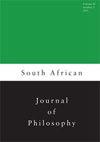Reviewing the law of non-contradiction: A Marxist reading
IF 0.2
3区 哲学
0 PHILOSOPHY
引用次数: 0
Abstract
Karl Popper argues that (i) because dialectics fails to comply with the law of non-contradiction (LNC) and (ii) a thought system that violates the latter is destructive to scientific theorising, dialectics cannot serve as the basis for scientific theorising. In connection with Popper’s accusation, the article seeks to review evidence of dialectical thinking in Marxist literature in accordance with the LNC to clarify the former’s relation to scientific theorising. Lucio Colletti and Lawrence Wilde are notable examples who have made clear commitments to extricate dialectics from the accusation that it violates the LNC. Despite the commendable contributions made, related conclusions do not arise from a concrete analysis of examples from Marxist dialectics about the LNC. We put forward two claims as our position and hence our contribution. First, we side with Popper’s premise (ii): that any thought system that fails to take the LNC seriously cannot validly support scientific theorising. Second, we oppose the truth of Popper’s premise (i): that dialectics undermines the LNC. Consequently, because premise (i) is unfounded, we are unable to grant the soundness of Popper’s contention against dialectics. According to our method of proof, we deploy the tool of concept analysis on relevant examples from Marxist literature. In the end, our overarching purpose is to show that dialectics operationalises the LNC and therefore Marxist dialectics is not disturbed by Popper’s objection.回顾不矛盾规律:马克思主义的解读
卡尔·波普尔认为:(i)由于辩证法不符合不矛盾律,(ii)违反不矛盾律的思想体系对科学理论具有破坏性,辩证法不能作为科学理论的基础。针对波普尔的指控,本文试图从辩证思维的角度来考察马克思主义文学中辩证思维的证据,以澄清前者与科学理论的关系。卢西奥·科莱蒂(Lucio Colletti)和劳伦斯·王尔德(Lawrence Wilde)是著名的例子,他们明确承诺将辩证法从违反LNC的指控中解脱出来。尽管做出了值得赞扬的贡献,但相关结论并不是通过具体分析马克思主义辩证法中关于LNC的例子得出的。我们提出了两项主张作为我们的立场,因此也是我们的贡献。首先,我们支持波普尔的前提(ii):任何不认真对待LNC的思想体系都不能有效地支持科学理论。第二,我们反对波普尔前提的真理:辩证法破坏了LNC。因此,由于前提(i)是没有根据的,我们无法证明波普尔反对辩证法的论点是正确的。根据我们的证明方法,我们对马克思主义文献中的相关例子进行了概念分析。最后,我们的首要目的是表明辩证法是LNC的可操作性,因此马克思主义辩证法不受波普尔反对意见的干扰。
本文章由计算机程序翻译,如有差异,请以英文原文为准。
求助全文
约1分钟内获得全文
求助全文
来源期刊

SOUTH AFRICAN JOURNAL OF PHILOSOPHY
PHILOSOPHY-
CiteScore
1.00
自引率
0.00%
发文量
19
期刊介绍:
The South African Journal of Philosophy (SAJP) is the official publication of the Philosophical Society of South Africa. The aim of the journal is to publish original scholarly contributions in all areas of philosophy at an international standard. Contributions are double-blind peer-reviewed and include articles, discussions of articles previously published, review articles and book reviews. The wide scope of the South African Journal of Philosophy makes it the continent''s central vehicle for the publication of general philosophical work. The journal is accredited with the South African Department of Higher Education and Training.
 求助内容:
求助内容: 应助结果提醒方式:
应助结果提醒方式:


